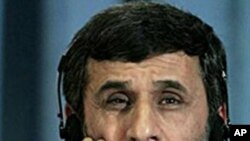After accepting a fresh Western proposal to resume nuclear talks in Vienna, Tehran appears to be disputing the agenda. A close aide to President Mahmoud Ahmadinejad says Iran has its own conditions for resuming the talks.
Iran is sending out mixed signals about its willingness to discuss key provisions of its nuclear program in talks proposed to begin November 15th in Vienna. Iran agreed to the talks with the United States and five other U.N. members on Friday.
Iranian President Mahmoud Ahmadinejad explained to government TV that Tehran is willing to discuss certain topics that it has agreed upon, and on its own terms. He said Iran has sent a letter to the International Atomic Energy Agency expressing its position and a framework for the talks. He insists that negotiations be based on what he calls "justice and respect," but complains that the Western side has not clarified its position.
Mr. Ahmadinejad's press advisor Ali Akbar Javanfekr expressed further reservations, according to Fars News Agency, stating Iran "would not just talk about the nuclear energy issue." He said that Tehran also wants the West to clarify its position over Israeli nuclear weapons and policies.
Former Iranian President Abolhassan Bani Sadr, who lives in exile in France, points out that inside Iran, many officials have been wondering recently why the West has not offered to resume negotiations, sooner. He said Iran has been in a defensive position since the June U.N. Security Council sanctions resolutions, and the West has seemed less and less inclined to negotiate. He points out Iranian leaders have been wondering recently why the West does not want to negotiate with Iran.
The former president says Mr. Ahmadinejad must appease his critics inside the regime, who will complain he is negotiating from a position of weakness. "By appearing to set new conditions," he explains, "Ahmadinejad can say Iran has imposed its own point of view."
Mr. Bani Sadr also notes that Supreme Leader Ali Khamenei recently called for a hardline position in nuclear talks with the West, during his visit to the holy city of Qom. He said Ayatollah Khamenei condemned the late Ayatollah Montazeri, who at one time was destined to become Iran's supreme leader, over his position to settle the nuclear crisis with the West in an amicable way. Khamenei, he says, called Montazeri's plan a "position of weakness," but would not stipulate what his own position of strength was.
Iran failed to accept a draft UN proposal in Oct. 2009 to send around 60 percent of its enriched-uranium stockpile abroad, for further enrichment. It also began to produce 20-percent grade highly enriched uranium in February, amid Western criticism. Iran has repeatedly refused to obey U.N. injunctions to stop enriching uranium.
Iran insists it needs to enrich uranium for peaceful, civilian purposes, but the West fears that it is covertly working to build nuclear weapons.
Iranian Official Says Tehran Has Own Agenda for Nuclear Talks




